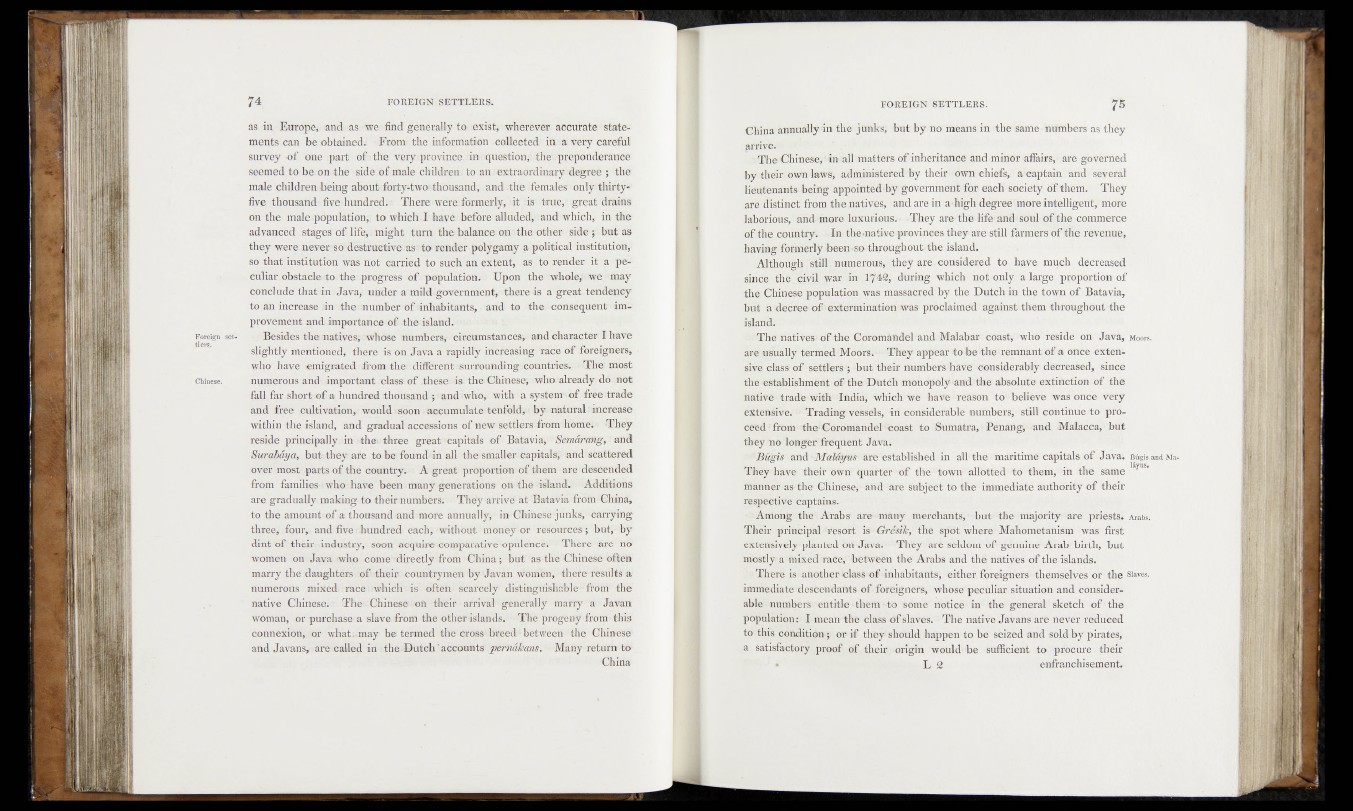
as in Europe, and as we find generally tonelist} vwherev&r accurate» statements
can bë obtained^ oFroirr tlie information ‘collected in arvery careful
smwey of one part? of» thse very (province, riuoquestionp theo]gepondefa®ce
seemed to be oh-the side,of male children! to* an ■.extraordinary degree ; the?
male children (being about* foity>two*thonsand, arnDthe-ife males tonl y thirty-"
five thousand« fivednandred.-.- Thermwer teformerly, -it ;is’ to e ,' igr-eat drains
on the malefpofralation,, to which I-have* TeforeaLMdedy-and which, in the
advanced stages ofilife/i might turn the;balance/onnthe>other tide p t a t as
they wère never.'sojestiuctive^as'-.to sender polygamy a-political institution,!
so that institution was iidt carried to such an extéht, as to render it a -pe«*
culiar obstacle«to<.tiie.^progress of-population. - Upon the ^whole/ we »may
conclude that: in Java, under a -mddlgöverttraent, there <is a" great tendency
toLan increase Jin -thgnnumber of inhabitants, ■ and -to then-consequent*=improvement
and irnpior tan ce ;of -th etisiand. ■:
. Besides tfaennativespwhOSe numbers/ cireiiinstances;- and character I' have
slightly mentioned^ there is on Java a rapidly increasing' r|8?e[ of foreigners,
who »have Tëinigaated Jram the- diffërent5surr0unding:ëöiintries. • >Thei most
numerous and important class of these is thei Chinese;-cwhïv already do mot
fall far shorfeof a hundred thousand-^ »and iwho,- with a systemaof - frèeitgadë
and free cultivation, would iSo'on • accumul ate; tenfold / »by »natural rincrease
within the island, and graduahaccessfons of new setöexsdromsftmei»! M'hey
reside principally, in the« three great-‘capitals o$olt&t&ïia^'Semêhing, • and
Surabaya, huts they .asc to befoundun all- thei-sffiallerieapitals? and-sfeatter ëd
over-most pasts of the country- - A«-great proportion- of them ;are'd£aofended
from familjesowhoihave been i munypgeaéfations ornthe »island. - • ‘'Additions
are ‘gradually, raakingtO thefenumbèrs; Théy arrivd'M^Bafcawia^froli'lShina,
to tias-jsSaountm £ a- thousand Mdsffliore annually/ in - GhifteSe^jonks;** berrying
thfeeffouro and five!hundred each, 'without' moneyor resources«; but,«"by
dint of fhehyandustny,- soon acquire Comparative 'opulence1/ - There «"are no
wotneh on J-wa.iwiis® colne,»direetlyifromj€lhftia; »buF' as tKé^Mnese often
marry the daughtéis ; tófntheiu' countrymen by Javan Womèn, «*fhéfel'*resulté;’a
numerous mixed race.'which is' often* scarcely distinguishable■ from iÉté
native Chinese!» Thei-Chineseuon 'their- arrival - 'generally marry a* Javan
wóman, oF-purcfiaseia slave from the other 'islands. r 1 'The-prpgeny'from’ this
. connexion,dor what>.may he termed the Bross' breed’5 between- 'the Chinese-
and Javans/i are called inithefDuteh'acconntS pèriiékans. Many«-retu'f,nli6o'
China annually in the j links?' but by no means in the same- mimbers as they
.HrrivëtWïJfhlV-^ K y 1 1
[o/ffheuChinese,‘in-all matters of’inheritance and-minor- affairs,' are governed
by their own laws; admiiiister-ed'by theitspbwn chiefs,- a'captain and several
lieutenants* being appointed ‘by* government- for-* each Society iff them.- They
are distinct from the natives, and are inadrigh degred^more intelligent, more
lahoripusf-and -mor© luxurious/. .They are-the life,-and*soul of thetcommerce 1
of the country* In tbemative provinces-they at-e- Still farmers of the rëvenue,
haying formerly been.so throughout-the island.
1 .Althougrrsfiil numerous/ they are,considered to have much decreased-
since Tthe ":civit war m :17'ê2, during which- not only a large proportion of
'the. Chinese population was massacred by the Dutch in the town of Batavia,
but a -deefefe'!0 f»extermination '-was> proclaimed against them 'throughout-the
islanSlw <
IwThé'iiatives» o f -the CdromaSrdel-'and -Malabar-- coasty<who- reside on Java, Moors. '
ate usually termed Moorsi*>*»EPftey appear t o be >the' remnant ofi-a once exten-
sW efagg/of^ seftferS»;-^but''théir numbers bave' 'considerably dëoreased, since
the«SfkfeliShmgnt dP the €>Utch monopoly*and‘the-absolute extinction of the’
fiativè'1 trade «with- India, which wé have Teason töJ1 believe was Once very
éxtè’n-si'vej »«Trading vessels, id eonsiderablë-mimbers, still continue to proceed/
ftom‘,theti3orom&ndel,:!éóast to -Sumatra, * Penadg,*-'and Malacca, but
tiïëyhiëden^f ftëqdent JérVaP * •’ ■'
«and üMhi%ï«s£aié''established in all* the - 'maritime capitals of Java; Bügisand
They'have their own' quartër jo£ ffeHown--allotted to *fhem,-in the same
Mianner-aS'fthe! ©Hirffes^'-hnd are Subject to the immediate authority of their
respective captains.
Among the* Arabs-- are1- many merchants, «‘-but^ the-“majority--are priestsi Arabs.
Their pr-iaeip'al Resort is -Grésilc, fhè spot where -Mahometanism was first
extensively»planted btt Java-.- -Theyralrè seldom of* gémiiné' Arab birth, bttt
mostly/a^nked rrace,' 'betweèn thé Arabs and thé natives of the islands.
There is*anothenk;ksS.oMnhabit.ants>, 'either, foreigners- themselves or the Slaves,
iittmediatcdescendants of-foreigners, Whose- «pecülihr- situation and considerable
- no-Mte'er's-mtitftie * them **te some' nbtice1 in- -the- general sketch -of " the
population r- -Tmean the- class of slaves-.' - The native Javansarë'Bèvfer'reduced
cbniiitiöin^ or-if- they should happen- to bë‘ sëizèd’'and sold by pirates,
a satisfactory proof of their-; origin would-be sufficient to -procure their
1‘J #•*' „L. g ■. enfranchisement.